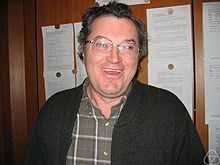József Beck

József Beck (Budapest, Hungary, February 14, 1952[1]) is a Harold H. Martin Professor of Mathematics[2] at Rutgers University.
His contributions to combinatorics include the partial colouring lemma and the Beck–Fiala theorem in discrepancy theory, the algorithmic version of the Lovász local lemma, the two extremes theorem in combinatorial geometry and the second moment method in the theory of positional games, among others.
Beck was awarded the Fulkerson Prize in 1985 for a paper titled "Roth's estimate of the discrepancy of integer sequences is nearly sharp",[3] which introduced the notion of discrepancy on hypergraphs and established an upper bound on the discrepancy of the family of arithmetic progressions contained in {1,2,...,n}, matching the classical lower bound up to a polylogarithmic factor. Jiří Matoušek and Joel Spencer later succeeded in getting rid of this factor, showing that the bound was really sharp.
Beck gave an invited talk at the 1986 International Congress of Mathematicians.[4] He is an external member of the Hungarian Academy of Sciences (2004).[1]
Books
- Jozsef Beck, William W. L. Chen: Irregularities of Distribution, Cambridge University Press, 1987.
- J. Beck: Combinatorial Games: Tic-Tac-Toe Theory, Cambridge University Press, 2008.
References
- ↑ 1.0 1.1 MEMBERS OF HAS. Hungarian Academy of Sciences. Accessed January 23, 2010
- ↑ Faculty. Department of Mathematics, Rutgers University. Accessed January 23, 2010.
- ↑ Delbert Ray Fulkerson Prize, American Mathematical Society. Accessed January 23, 2010.
- ↑ J. Beck, Uniformity and irregularity. Proceedings of the International Congress of Mathematicians, Vol. 1, 2 (Berkeley, Calif., 1986), pp. 1400–1407, American Mathematical Society, Providence, RI, 1987, ISBN 0-8218-0110-4
External links
- József Beck, personal webpage, Department of Mathematics, Rutgers University
- József Beck, Mathematics Genealogy Project
|